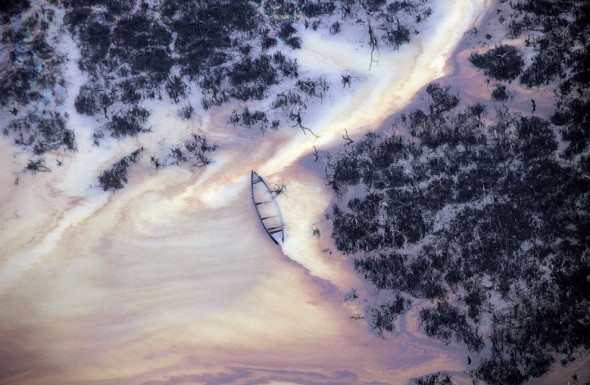
Oil flows past a sunken boat in a creek near an illegal oil refinery in Ogoniland, outside Port Harcourt, in Nigeria’s Delta region, on March 24, 2011. (Photo: Sunday Alamba © Amnesty International
Last week’s Dutch court ruling in the case brought by four Nigerian farmers against Shell for oil pollution damage is being reported as a “victory” for both the plaintiffs and for Shell.
So, who really won? It depends how you look at things. Live Wire, Amnesty International’s blog, has a an excellent summary of the case and the ongoing challenges facing those who want Shell to clean up its mess in the Niger Delta. The court ruled in favor of one plaintiff and that is significant. Shell will have to pay compensation to the farmer and, according to Amnesty International, “This week’s ruling means Shell can no longer point to sabotage as if the company has no responsibility for this problem, and it should have wider ramifications for Shell’s Nigeria operations.”
But the court ruled agains three of the plaintiffs and as Amnesty International points out, “All of the plaintiffs were faced with an almost impossible task in proving their cases. They alleged the oil spills were due to operational failure, and not sabotage, a crucial distinction for determining the extent of the company’s liability. However, in considering the four farmers’ claims the Dutch court had to rely on Shell’s own oil spill investigation reports.”
Self monitoring, investigation and reporting are the norm across the Gulf of Guinea. Shell, Exxon Mobil, Chevron, etc. all do their own monitoring and investigating, and as this recent case indicates, obtaining information from multinational oil companies is next to impossible for poor communities. “It is clear that the farmers simply did not have access to the information and expertise to challenge Shell’s assertions,” Amnesty reports.
“The plaintiffs in this case had requested access to documents held by Shell, which – they believe – would have helped support their claims. Shell holds most of the data on oil spills and related measures. Under Dutch legal rules, in order to obtain the necessary documents from Shell, the farmers virtually had to prove their claim before the court hearings started. Their request for key documents was denied.”
Read the entire blog post, Shell’s Niger Delta pollution: the good, the bad and the ongoing quest for justice, by Audrey Gaughran here.
For background on the case, visit Worse than Bad.
Environmental Rights Action (Friends of the Earth) in Nigeria has called the ruling a watershed. To learn more read here.
